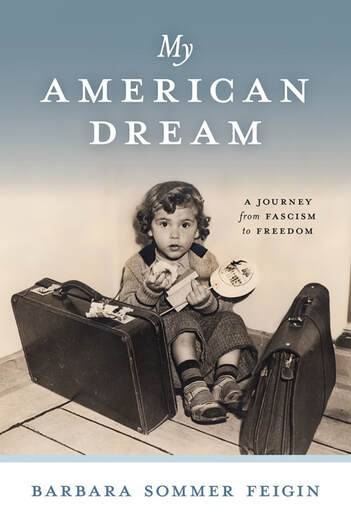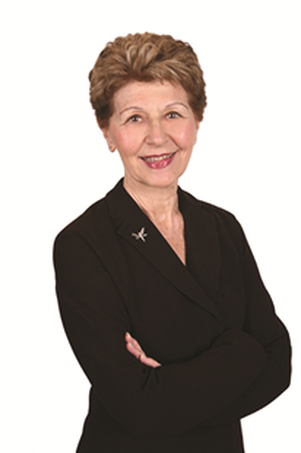Play & Book Excerpts
My American Dream
(Five Star Press)
© Barbara Sommer Feigin
Excerpted from the Introduction with permission from Five Star Press...
One morning in 2013, when I’m in my office in New York City, my phone rings. It’s my sister, Carolyn, calling from Annapolis, Maryland, where she and her family have lived for many years.
Carolyn tells me she has amazing news for me. She says she’s found a detailed journal among my late father’s papers, one he wrote before and during the terrifying escape our family—my Jewish father, my mother, and I, at two-and-a-half years old—made in 1940, at the onset of World War II, from Nazi Germany to Yokohama, Japan, and then across the Pacific Ocean to Seattle and finally to Chehalis, a small farming and logging town in southwest Washington State, where we settled.
I am dumbfounded—shocked, to learn this journal exists. Of course I’ve always known that our family made this escape, but not a single detail beyond that. I remember nothing, and my parents never spoke of it. For me, though I was born on November 16, 1937, in Berlin, it was as if our family's life began when we arrived in America.
Carolyn sends me a copy of the journal. When I receive it an electric shock runs through my body and into my brain. As I turn the pages, I’m rapt, emotionally overwhelmed, and nearly incredulous. . . .
My father’s journal presents a story of intrigue, of the terrifying fear of the unknown and of death, and ultimately of the elation of finding freedom. Our escape marked a historical turning point for us, one that was life changing and life affirming and that affected not only the three people involved, but their children, their children’s children, and all generations to come. The story is riveting; my father brings us all into the experience with vivid, evocative descriptions of everything he saw and heard and did, and with powerful and poignant descriptions of the emotions he felt.
The words of my father told me a great deal about my parents, things I’d never even thought about as I was growing up. I began to understand them and to understand myself more fully as I developed a highly raised consciousness not only about their terrifying, death-defying escape but also about their great strengths of character: their courage and bravery, their perseverance and determination, their optimism through incredibly stressful times, and their resilience when they were faced with nearly insurmountable obstacles. . .Underpinning everything was my parents’ deep love of family.
Having gone through most of my life knowing nearly nothing of my parents’ background and experiences and how all of this shaped their lives, I vowed that this would not be the case for my own children and grandchildren and future generations. I want them to know my own story.
As I began the process of writing this memoir, I came to realize my story is actually three intertwined stories. The first is of a young, German-speaking refugee girl in a small town yearning to become an authentic American. The second is of a trailblazing woman executive who forged a successful career in a male-dominated business—advertising—in a time when career-building opportunities for women were virtually non-existent. And simultaneous with building a career, the third story is of a wife and mom of three sons fiercely dedicated to building strong family bonds during sometimes-turbulent times, including twenty-five years when I was a caregiver for my husband, who suffered two very serious strokes when he was quite young.
At a time when our country has arguably never been more compromised by divisiveness, hate, even violence, the ravages of the COVID pandemic, systemic racism, xenophobia, economic hardship, and despair, it occurs to me that my story might serve as more than a family record. I hope it will remind us—as Americans—who we are at our core, when we try to be the best we can be.
The following pages begin with the story my mother told Carolyn, who shared it with me at the time of the discovery of the journal. It tells of my parents, as they realized they would need to flee Germany due to the Nazis’ persecution of Jews, and of their frantic efforts to do so. The story then goes on, in my father’s voice, through his journal, which is full of misspellings, lines struck out, penciled-in additions, inconsistencies, etc.. . .the word choices and grammar have been largely preserved.
I have. . .tried to weave my parents’ story into my own, reflecting not only our broad family history but also those values that have shaped our lives. I hope you will treasure this memoir as much as I treasure the memories described.
One morning in 2013, when I’m in my office in New York City, my phone rings. It’s my sister, Carolyn, calling from Annapolis, Maryland, where she and her family have lived for many years.
Carolyn tells me she has amazing news for me. She says she’s found a detailed journal among my late father’s papers, one he wrote before and during the terrifying escape our family—my Jewish father, my mother, and I, at two-and-a-half years old—made in 1940, at the onset of World War II, from Nazi Germany to Yokohama, Japan, and then across the Pacific Ocean to Seattle and finally to Chehalis, a small farming and logging town in southwest Washington State, where we settled.
I am dumbfounded—shocked, to learn this journal exists. Of course I’ve always known that our family made this escape, but not a single detail beyond that. I remember nothing, and my parents never spoke of it. For me, though I was born on November 16, 1937, in Berlin, it was as if our family's life began when we arrived in America.
Carolyn sends me a copy of the journal. When I receive it an electric shock runs through my body and into my brain. As I turn the pages, I’m rapt, emotionally overwhelmed, and nearly incredulous. . . .
My father’s journal presents a story of intrigue, of the terrifying fear of the unknown and of death, and ultimately of the elation of finding freedom. Our escape marked a historical turning point for us, one that was life changing and life affirming and that affected not only the three people involved, but their children, their children’s children, and all generations to come. The story is riveting; my father brings us all into the experience with vivid, evocative descriptions of everything he saw and heard and did, and with powerful and poignant descriptions of the emotions he felt.
The words of my father told me a great deal about my parents, things I’d never even thought about as I was growing up. I began to understand them and to understand myself more fully as I developed a highly raised consciousness not only about their terrifying, death-defying escape but also about their great strengths of character: their courage and bravery, their perseverance and determination, their optimism through incredibly stressful times, and their resilience when they were faced with nearly insurmountable obstacles. . .Underpinning everything was my parents’ deep love of family.
Having gone through most of my life knowing nearly nothing of my parents’ background and experiences and how all of this shaped their lives, I vowed that this would not be the case for my own children and grandchildren and future generations. I want them to know my own story.
As I began the process of writing this memoir, I came to realize my story is actually three intertwined stories. The first is of a young, German-speaking refugee girl in a small town yearning to become an authentic American. The second is of a trailblazing woman executive who forged a successful career in a male-dominated business—advertising—in a time when career-building opportunities for women were virtually non-existent. And simultaneous with building a career, the third story is of a wife and mom of three sons fiercely dedicated to building strong family bonds during sometimes-turbulent times, including twenty-five years when I was a caregiver for my husband, who suffered two very serious strokes when he was quite young.
At a time when our country has arguably never been more compromised by divisiveness, hate, even violence, the ravages of the COVID pandemic, systemic racism, xenophobia, economic hardship, and despair, it occurs to me that my story might serve as more than a family record. I hope it will remind us—as Americans—who we are at our core, when we try to be the best we can be.
The following pages begin with the story my mother told Carolyn, who shared it with me at the time of the discovery of the journal. It tells of my parents, as they realized they would need to flee Germany due to the Nazis’ persecution of Jews, and of their frantic efforts to do so. The story then goes on, in my father’s voice, through his journal, which is full of misspellings, lines struck out, penciled-in additions, inconsistencies, etc.. . .the word choices and grammar have been largely preserved.
I have. . .tried to weave my parents’ story into my own, reflecting not only our broad family history but also those values that have shaped our lives. I hope you will treasure this memoir as much as I treasure the memories described.
|
Barbara Feigin graduated from Whitman College, earning a Bachelor of Arts degree in political science and completed a graduate program in business administration run jointly by Harvard Business School and Radcliffe Graduate School. In her illustrious 30-year career at Grey Advertising (now Grey Global Group), she solidified her reputation as a visionary thinker. In all her years as a senior advertising executive and a corporate director, she was more often than not the only woman in the room. In 2017, Feigin was named one of the century’s Legendary Pioneers by Grey.
Barbara has passed her swagger and hard work ethic on to her three high-achieving sons: Peter, President of the Milwaukee Bucks and FiservForum; Daniel, head of Trevor Day School, a nursery through 12th grade independent school in New York City; and Michael, managing editor at Trellus, an online healthcare start-up. |
Photo Courtesy: Barbara Sommer Feigin
|




